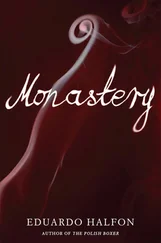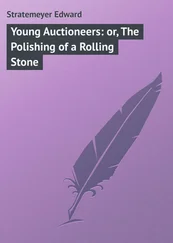Eduardo Halfon - The Polish Boxer
Здесь есть возможность читать онлайн «Eduardo Halfon - The Polish Boxer» весь текст электронной книги совершенно бесплатно (целиком полную версию без сокращений). В некоторых случаях можно слушать аудио, скачать через торрент в формате fb2 и присутствует краткое содержание. Год выпуска: 2012, Издательство: Bellevue Literary Press, Жанр: Современная проза, на английском языке. Описание произведения, (предисловие) а так же отзывы посетителей доступны на портале библиотеки ЛибКат.
- Название:The Polish Boxer
- Автор:
- Издательство:Bellevue Literary Press
- Жанр:
- Год:2012
- ISBN:нет данных
- Рейтинг книги:4 / 5. Голосов: 1
-
Избранное:Добавить в избранное
- Отзывы:
-
Ваша оценка:
- 80
- 1
- 2
- 3
- 4
- 5
The Polish Boxer: краткое содержание, описание и аннотация
Предлагаем к чтению аннотацию, описание, краткое содержание или предисловие (зависит от того, что написал сам автор книги «The Polish Boxer»). Если вы не нашли необходимую информацию о книге — напишите в комментариях, мы постараемся отыскать её.
marks the debut of a major new Latin American voice in English.
The Polish Boxer — читать онлайн бесплатно полную книгу (весь текст) целиком
Ниже представлен текст книги, разбитый по страницам. Система сохранения места последней прочитанной страницы, позволяет с удобством читать онлайн бесплатно книгу «The Polish Boxer», без необходимости каждый раз заново искать на чём Вы остановились. Поставьте закладку, и сможете в любой момент перейти на страницу, на которой закончили чтение.
Интервал:
Закладка:
They served us pasta and vegetables for lunch. Next to me sat a history professor from a small university in Idaho, or Washington, or one of those other states on the Pacific coast, a man fat as a bear, whose only interest was practicing his awful Spanish. After the meal I needed a cigarette. I tried to get up but felt a hand on my shoulder, and heard a slow, hoarse voice asking me where I was going. It was Joe Krupp. I then realized he’d been the only one not to speak at all during the morning session. You in a hurry, kid? he asked. I said I wasn’t, that I was just going to smoke a cigarette. He stood there without speaking, looking through the huge windowpane out into the void. Ah, you smoke, he remarked. I said nothing. But quitting smoking is the easiest thing in the world, my friend. And then he added, very seriously: I’ve done it thousands of times. His hand was still on my shoulder. I like walking after I eat. What do you say we walk for a while, kid? he said, indicating the golf course with his sky blue eyes.
The path curled over the man-made prairie. Every now and then we had to stand to one side, to make way for a few golfers dressed up like clowns and chasing white balls in their charming little mechanized carts. Joe Krupp walked like he spoke: slowly, serenely, as though his feet and his words were in no hurry to get where they were going, or as though they weren’t going anywhere at all. How wonderful life would be if we were born in old age, I thought as I listened to him talk of his childhood in Missouri, of his experiences in the war, of how he had met his wife. Krup-powsky. Polish, originally. I thought of my grandfather and the bottle of whiskey we’d drunk together while he told me about Sachsenhausen and Auschwitz and the Polish boxer. Do you like living in Guatemala, kid? he asked, and then allowed me to speak for a long time without interrupting, one hand behind his back and the other resting on my shoulder. I don’t know whether this was to steady himself or out of affection. Both, I’d like to think. I lit another cigarette and we walked for a while in silence until he told me that he’d found the comparison between Tom Sawyer and Don Quixote interesting. Very interesting, kid, but you should know that in Thomas A. Tenney’s book, Mark Twain: A Reference Guide , there are more than ten essays on the relationship between Miguel de Cervantes and Mark Twain, one of them in Spanish, if I remember rightly. I kept quiet. And I should tell you, he continued after another quartet of golfers had passed, that that book only lists works published up to 1975, and I’m sure there are other papers you could look up that have been written since then. We sat down on a bench next to an enormous cypress tree. For some reason I’d assumed Joe Krupp was an economist or perhaps a historian, and I told him this, a little ashamed. No, far from it, he said, laughing, I was a professor of literature for nearly fifty years, kid, here at Duke University most of the time, and I’ve been studying Mr. Twain for nearly as long. (I’d learn later, browsing in the library, that Joe Krupp was one of the most important academics specializing in Twain’s work.) I stuttered that I was sorry, that I didn’t know. And I bet you also didn’t know that Mr. Twain spent some time in Central America. What do you think of that? he said, and let out a sharp laugh. That’s right kid, in Nicaragua, around the corner from your own country, in 1866. I hadn’t known that either. Mr. Twain, he called him, with that almost sacred respect you can only develop over long years of literary veneration, and it occurred to me that, in a quite unusual way, Joe Krupp spoke like Mark Twain himself must have spoken. Suddenly a cat came up to us, rubbed up against my legs and then, when I bent down to stroke it, ran away. I noticed the old man give a strange smile. Like a man in love, I thought, and then corrected myself: like a man in sadness. Mr. Twain wrote that one of the most notable differences between a cat and a lie, he said, is that a cat only has nine lives. He smiled and got up with a little difficulty. So, my friend, you can never believe what Mr. Twain says about anything, even his own name. We walked back in silence, his hand on my shoulder. I remember him telling me in all seriousness that he was tired and needed to rest for a while so he could go out dancing later with his wife. Tangos, he said.
There was another session that afternoon. I didn’t say much. I drank cup after cup of an almost transparent coffee in order not to fall asleep during the tedious intellectual debate on conscience and morality in Twain’s characters. They focused on Jim and Huck. Joe Krupp remained silent again, listening and appraising with an enigmatic look that seemed to me like the mixture of pity and mockery that you see on the face of a mime. When we’d finished, they took us all by minibus to a Greek restaurant. I ate roast lamb and drank enough wine to endure the moronic conversation about terrorism and the war in Iraq that, according to everyone there, the United States was winning. Idiots, I whispered, already half-drunk. I was tired when I got back but didn’t feel like sleeping. Stretched out on my bed and looking at the images on the muted television without really seeing them, I smoked for a while in silence. I went out onto the balcony, hoping to see the woman next door crying. There was nobody there. I looked for my coat.
The lobby was all but deserted. I went into the bar and asked the waiter if they sold cigarettes. There’s a machine over there, sir, he replied and he took me over to show me. Nice people, southerners. I was just about to ask for a beer at the bar when I heard my name. It was Harold Lewis, the Mormon, sitting alone in a corner, and I suppose he saw the confusion on my face because he raised his glass straight away. Don’t worry, it’s apple juice. He explained that sometimes he found it very difficult to sleep, especially in hotels, and told me to join him for a while. I mumbled some poor excuse about being tired or having reading to do or whatever it was. And see you tomorrow.
I needed a bit of fresh air and went out to the golf course. I walked a few holes, smoking, shivering from the cold but happy to be outside. The full moon cast a gray light on everything. It was a bland, tasteless gray that for some reason reminded me of old neorealist Italian films. A little way off, a strange shape caught my eye. I thought some golfer must have left his bag of clubs on the grass, but when I got closer I realized that the large mass was moving, just slightly. A deer, I thought, and carried on walking toward it. I was perhaps ten or fifteen yards away when I heard a squeal and ran to hide behind the nearest tree. She had her shirt open. She was on top of him, thrusting rhythmically and moaning as if she were alone in the universe. Without being able to make out what he was saying, I could hear him whispering, his voice getting louder while his hands grabbed desperately at her stomach and breasts. I stayed where I was, in spite of the cold, watching them copulate on the fairway like two wild animals, until after a while I decided to withdraw in silence. I don’t know why. Maybe out of embarrassment, or maybe because I’m an average man and my three minutes were up. Who knows.
I didn’t sleep much. For breakfast, I had a roll with cream cheese, and arrived late and dozy to the last session.
I poured myself a coffee while everyone discussed Life on the Mississippi , a fairly fragmented, semiautobiographical work, which recounts the vicissitudes of Twain’s life on the steamboats of the Mississippi. For nearly three hours they debated the author’s economic ideas, his conception of identity, his criticism of the fake southern aristocracy, and his notion of liberty. At one inopportune moment, I pointed out that here again Twain mentioned his admiration for Don Quixote . What an idiot, I thought, and I’m sure everyone else thought the same. But while I talked about Tom and Huck and Sancho and that Sad-Faced Knight, I thought I sensed some kind of stylistic correlation between the two authors, or no, rather than stylistic it was philosophical, cosmological, but it vanished again just as quickly as I’d found it, and right in the middle of my argument, as though I’d simply run out of gas, I stopped talking.
Читать дальшеИнтервал:
Закладка:
Похожие книги на «The Polish Boxer»
Представляем Вашему вниманию похожие книги на «The Polish Boxer» списком для выбора. Мы отобрали схожую по названию и смыслу литературу в надежде предоставить читателям больше вариантов отыскать новые, интересные, ещё непрочитанные произведения.
Обсуждение, отзывы о книге «The Polish Boxer» и просто собственные мнения читателей. Оставьте ваши комментарии, напишите, что Вы думаете о произведении, его смысле или главных героях. Укажите что конкретно понравилось, а что нет, и почему Вы так считаете.












